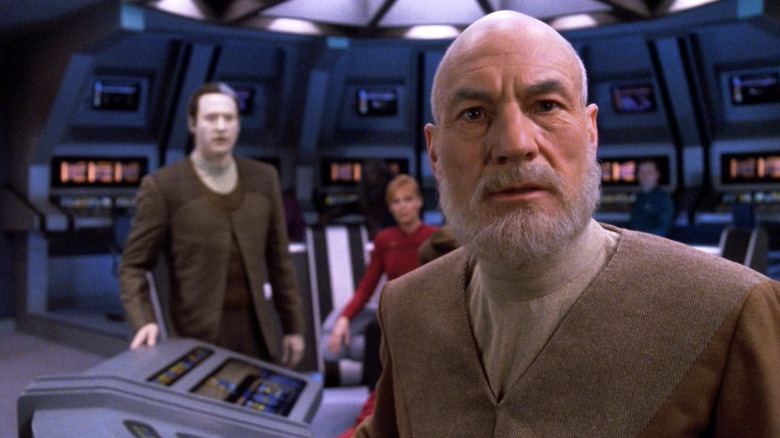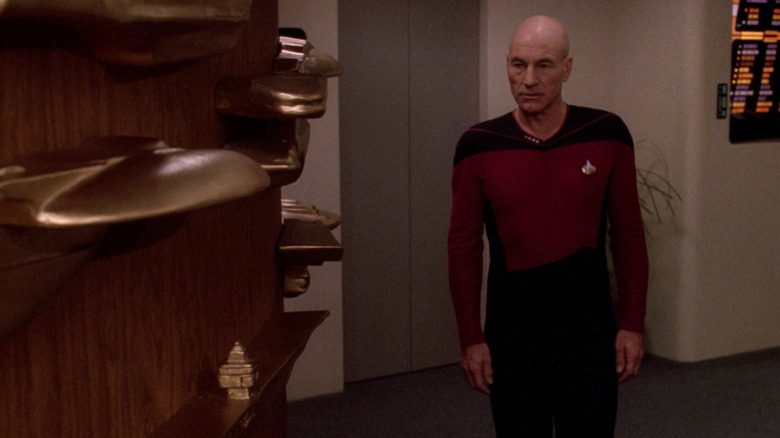Patrick Stewart Was Glad Star Trek: The Next Generation Ended With Season 7
Ask any Trekkie, and they'll happily describe the arc of the three "Star Trek" shows that came to ascend in the 1990s. In the cases of "Star Trek: The Next Generation," "Star Trek: Deep Space Nine" and "Star Trek: Voyager," the shows started on their rockiest, least interesting seasons as they found their footing. All three shows showed growth during their second seasons but were still staggering to their feet. For the third, fourth, and fifth seasons, the shows had hit their stride, turning out the most interesting stories and exploring exciting new arcs. The sixth and seventh seasons, meanwhile, showed signs of fatigue, and the final episodes of each show proved to be a little rocky.
As of this writing, no "Star Trek" show has lasted as long as those three. "Star Trek: Discovery" will end after its fifth season next year, and no one was more sharply aware of the traditional "Star Trek" quality arc than Patrick Stewart, who played Captain Jean-Luc Picard on "Next Generation." While Trekkies might have happily consumed an eighth, ninth, or tenth season of NextGen, Stewart, and many viewers felt that it was time to bring things to a close.
The title of the final episode of "NextGen" is "All Good Things..." an abbreviation of the axiom "all good things must come to an end." 1994, it seems, was the perfect time for that. In his new autobiography "Making It So: A Memoir," Stewart stated in no uncertain terms that latter-day NextGen was starting to suffer. Stewart also, after seven successful years, wanted to move beyond the single acting gig. Staying Jean-Luc forever was not something he was interested in.
All good things must come to an end
Stewart was sharply aware of being typecast. "Star Trek" has a tendency to rob actors of their identities, keeping them locked into a single role for the rest of their lives; it's hard to audition for a new film if the casting agents only see you as someone who can work on the bridge of the starship Enterprise. "I had developed a fear of losing out on film roles because Hollywood would only ever see me as the 'Star Trek' guy," Stewart wrote. "This was more than just paranoia. A major director said, to my face, 'Why would I want Jean-Luc Picard in my movie?'"
Seven years, Stewart said, was plenty. Not everyone felt the same way, it seems, and several of Stewart's co-stars would have been happy to continue acting on "Next Generation," but the actor felt a general downward arc at work. He wrote:
"By the seventh and final season — yes, we went one more than my original contract called for — I was getting very, very restless, and I felt that the scripts did not scale the same heights as before. To be honest, I was happy that the show was coming to an end. I know this sentiment was not shared by many of my fellow cast members, and that Paramount might have let the show carry on for a few more seasons had I been amenable. But I needed a change."
And a change is what Stewart got. His first gig after "Star Trek" was Christopher Ashley's 1995 queer romantic comedy "Jeffrey" starring Steven Weber and Michael T. Weiss, based on the play by Paul Rudnick. Stewart played a friend of the protagonist and Bryan Batt played his boyfriend.
One last hurrah
Despite his not-so-glowing opinion of the final season of "Star Trek: The Next Generation," Stewart was at least fond of the series finale. It was a Picard-centric episode, and, like in Kurt Vonnegut's "Slaughterhouse-Five," saw the character become "unstuck in time." He described it thus:
"I am pleased to say that our writers rose to the occasion for our last hurrah, the aptly titled 'All Good Things...' whose two parts, the 177th and 178th episodes of our program, closed out our epic run. Picard becomes unstuck in time, hopping between three different periods: the past, specifically a short time before the events of TNG's pilot, "Encounter at Farpoint", the present; and 25 years in the future, when Picard faces a debilitating disorder akin to dementia, and Riker looks somewhat like Jonathan Frakes really does now."
The plot involved a spatial anomaly that grew larger the further back in time it traveled, and Picard had to investigate it in three different time frames. A lot of the "future" scenes introduced elements that would later appear on "Star Trek: Picard." And shooting the last episode was a delight in itself. He remembered the final scene he shot, writing:
"As we began, the set was crowded with visitors, but by the time the first assistant director announced, "Aaaand that's a wrap," only a dedicated crew was still there, and there was just a smattering of applause. Rick Berman was on set, though, and gave me a hug, holding me in his embrace as he thanked me for my service."
Berman was the executive producer. Stewart would immediately move into production on the feature film "Star Trek: Generations."


